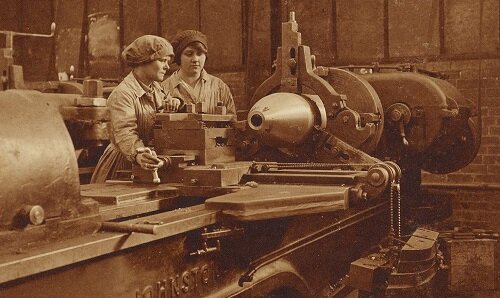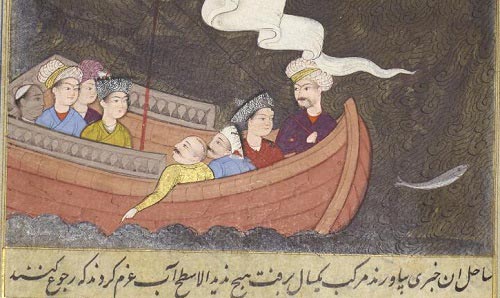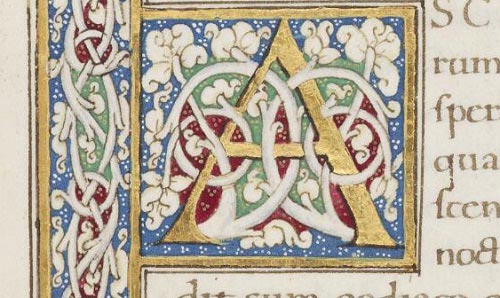
Social and Political History Collections
The collections provide important primary sources for major political and social developments from the 16th to 20th centuries.

The great social campaigns of the 19th and early 20th centuries, such as the abolition of slavery, factory reform and the emancipation of women, are documented in numerous archives. Coverage for the printed collections is wide-ranging, from Tudor texts to the literature of 20th-century social and political movements such as socialism and the campaign for family planning.
Archives
The Manchester Guardian Archive is a major source for political, military, economic, social and technological developments of the 20th century. It contains correspondence with a large number of politicians and statesmen, and almost every major political event and social trend is documented in the correspondence and despatches. The papers of W.P. Crozier, former editor of the Manchester Guardian, contain interviews with leading politicians and statesmen, while the manuscript collection of A.P. Wadsworth, another former editor, is important for the social and economic history of Lancashire, and includes material relating to the Peterloo Massacre of 1819. The Peterloo Relief Fund Account Book, for example, lists the names and addresses of people who received payment for injuries received during the Massacre.
The Stapleton Manuscripts and the Brooke of Mere Muniments contain detailed information on plantations operated by enslaved people in Montserrat and Antigua respectively, and are significant for studies of the slave trade and the slave economy in the West Indies. The Library also holds a volume containing documents relating to slave-run plantations in Dominica (English MS 894). The campaigns against enslavement are documented in the Raymond English Anti-Slavery Collection (which largely comprises the personal papers of George Thompson, a veteran orator who spoke on causes from anti-slavery to temperance and fair trade), and the H. J. Wilson Anti-Slavery Collection.
The Library holds the archives of several women’s suffrage movement organisations: the Parliamentary Committee for Women’s Suffrage; the Manchester Men’s League for Women’s Suffrage; the National Union of Women’s Suffrage Societies; and the International Woman Suffrage Alliance. The nature of women’s work during the First World War is captured in the photographic Album of Women’s Work in Wartime.
19th-century campaigns to improve the working conditions, wages, education and housing of the working classes are documented in the Papers of the Fielden Brothers (including material on the factory reformer John Fielden and William Cobbett), the Kay-Shuttleworth Papers (education, poor relief and social reform) and Richard Cobden Letters. The Ashworth Cross Family Papers offer insights into a politically prominent family connected with the free trade movement, the cotton interest and Quakerism.
The Ahmed Iqbal Ullah RACE Centre, part of the University of Manchester Library’s Special Collections, is home to a rapidly growing collection of archives that document issues of race, ethnicity and migration, and the lived experience of Global Majority communities in Greater Manchester and further afield. The Centre holds national collections relating to race relations in the UK, such as the Commission for Racial Equality and the Institute of Race Relations; the archives of community organisations in Greater Manchester, including those of Ananna: Manchester Bangladeshi Women's Organisation, and the Manchester Refugee Support Network; as well as the papers of individuals who have made a difference in fighting racism and promoting diversity and inclusion, among them Ann Adeyemi, Malik Bakht and Eloise Edwards.
Manchester’s social history is reflected in the archives of Agecroft Rowing Club, Manchester Reform Club, Birch Chapel Ragged School and the charities Henshaws (Henshaw’s Society for Blind People) and Wood Street Mission (Manchester & Salford Street Children’s Mission).
The Library holds papers of several national and local politicians, including the first Labour Prime Minister James Ramsay MacDonald (1866-1937); Thomas Spring Rice (1790-1866), 1st Baron Monteagle of Brandon, Chancellor of the Exchequer; Sir John Bowring (1792-1872), MP for Bolton and Anti-Corn Law League campaigner; J. T. W. Newbold (1888-1943), Britain’s first Communist MP; and the Manchester councillor Dame Mabel Tylecote (1896-1987). The Pink Papers contain copious biographical information on Members of Parliament.
Other collections include the Aladin Papers (mainly pre-Revolution Russia); the Axon Papers (Manchester local history, journalism, social reform); the Leonard Behrens Papers (United Nations, Liberal Party, social and cultural life of Manchester); the Dale Papers (Cheshire poor law and parish records); the Heald-Hall Family Papers (trade, military and physical medicine); the Hibbert-Ware Papers (local history, military history and antiquarian); the Simon Papers (the Frankfurt Parliament and Revolution of 1848); and the D. A. Wilson Papers (socialism and trade unionism). The papers of Dorothy Richardson comprise detailed accounts of travel in England during the late 18th century, illustrated with drawings, and offer extensive scope for cultural, social, gender and art history.
The Library also holds papers of two historians of government and politics: Sir Lewis B. Namier (1888-1960), Professor of History at Manchester University, 1931-1953, and author of The Structure of Politics at the Accession of George III (1929); and Samuel Finer (1915-1993), Professor of Government at Manchester University and later Gladstone Professor of Government and Public Administration at Oxford.
Printed resources
The Sir John Neale Collection includes works covering almost every aspect of the reign of Elizabeth I. The English Tract Collection comprises over 15,000 items relating to political, social and theological subjects mostly collected by the 1st and 2nd Earls Spencer; many date from the Civil War period. Further tracts of the late 17th and early 18th centuries are to be found within the Sutherland Collection. The Ferguson Collection is particularly valuable for the study of Scottish history and literature in the 16th and 17th centuries. The Poll Book Collection comprises some 1,000 poll books, broadsides, posters and leaflets relating to English parliamentary elections in the 18th and 19th centuries. Other general historical collections include the Ashburne Hall Collection, which holds many 17th and early 18th-century items, and the Edward Freeman Printed Collection.
Publications of all the major political parties are represented in the 20th-century Election Literature Collection. The campaign for the abolition of slavery is recorded in the H. J. Wilson Anti-Slavery Collection. The history of education of deaf people is the subject of the Deaf Education Collection, while the Marie Stopes and Birth Control Collection is concerned with the family-planning movement of the 20th century. In another field entirely, the history of sport and leisure is represented in the Brockbank Cricket Collection.
The history of English socialism and radicalism is comprehensively documented. The Benson Collection comprises early socialist periodicals such as Hog’s Wash and monographs by Robert Owen, George Jacob Holyoake and other radicals. It also includes all the major publications of the Independent Labour Party. The massive collection of pamphlets and reports from the Labour Party Library documents the history of British and international socialism in unparalleled detail, and is a key source for studies of the major events and trends of the twentieth century. The Dame Mabel Tylecote Printed Collection holds material relating to the Fabian Society and the fledgling Labour Party. On a more contemporary note the Dave Cunliffe Collection includes flyers and posters on animal rights, anti-war and environmentalism from the 1960s to 1980s.
In addition to primary source materials, the Special Collections contain a full range of secondary literature, including key historical monographs, periodicals, numerous series of record society publications, and a complete set of the Calendars of Rolls, State Papers and other public records published by the Public Record Office.
French political history
French history is also well represented. The period of the Fronde, 1648-1653, is documented in the Mazarinades Collection, while the Preston Pearce Collection contains documents from the century before the French Revolution, constituting a fascinating resource for the social and political history of the country in the 17th and 18th centuries. The French Revolution Collection is acknowledged to be one of the finest in Britain, comprising some 40,000 monographs, periodicals, newspapers, proclamations and broadsides, from the time of the Revolution up to the restoration of the Bourbons.
List of physical collections (A-N)
Physical collections (A-N)
- Agecroft Rowing Club Archive
- Alexis Aladin Papers
- Ashburne Hall Collection
- Ashworth Cross Family Papers
- Association of Certifying Factory Surgeons Archive
- Axon Papers
- Leonard Behrens Papers
- Benson Collection
- Bowring Papers
- Brockbank Cricket Collection
- Brooke of Mere Muniments
- Christian Women's Information and Resource Service Archive
- Richard Cobden Letters
- County Histories
- W. P. Crozier Papers
- Dale Papers
- Deaf Education Collection
- Election Literature Collection
- English Tract Collection
- Raymond English Anti-Slavery Collection
- Frederick S. Ferguson Book Collection
- Fielden Brothers Papers
- Samuel Finer Papers
- Edward Freeman Printed Collection
- French Revolution Collection
- Guardian (formerly Manchester Guardian) Archive
- Mary Hamilton Papers
- Heald-Hall Family Papers
- Henshaws (Henshaw’s Society for Blind People) Archive
- Hibbert-Ware Papers
- James Kay-Shuttleworth Papers
- Knutsford District of Foresters Friendly Society Records
- James Ramsay MacDonald Papers
- Manchester Masonic Research Collection
- Manchester Reform Club Archive
- Manchester Settlement Archive
- Mazarinades Collection
- Lewis Namier Papers
- Sir John E. Neale Book Collection
- Newbold Papers
List of physical collections (P-W)
Physical collections (P-W)
- Peterloo Relief Fund Account Book
- Pink Papers
- Poll Book Collection
- Ronald Preston Papers
- Dorothy Richardson Papers
- Royal Botanical and Horticultural Society of Manchester and the Northern Counties Archive
- Heinrich Simon Papers
- Rawson/Wilson Anti-Slavery Papers
- Spring-Rice Collection
- Stapleton Manuscripts
- Marie Stopes and Birth Control Collection
- Street Literature Collection
- Sutherland Collection
- Dame Mabel Tylecote Papers
- Dame Mabel Tylecote Printed Collection
- Wadsworth Manuscripts
- Papers of D. A. Wilson
- H. J. Wilson Anti-Slavery Collection
- Women in Theology Group Archive
- Women's Suffrage Movement Archives
- Wood Street Mission Archive
List of digital collections
Digital collections
- The Bow in the Cloud: original manuscripts of contributions to The Bow in the Cloud, or The Negro’s Memorial (1834), together with numerous letters to the volume’s editor, Mary Anne Rawson.
- Nancy Cunard Correspondence: former heiress, author and political activist, who acted as a foreign correspondent for the Guardian during the closing months of the Spanish Civil War.
- Manchester Guardian: a selection of digitised material from the vast archive of the Manchester Guardian newspaper.
- Manchester Observer (1818-1822): a complete set of England’s leading radical newspaper at the time of the ‘Peterloo’ meeting of August 1819, in which it played a central role.
- Peterloo Collection: a unique collection of documents, books and newspapers relating to Peterloo.
- Rag Rag: magazines produced by University of Manchester students and sold to raise money for charity; their humour reflects the attitudes and prejudices of the period.
- Wood Street Mission: a selection of photographs and documents from the local child-poverty charity.
Further information
Related subject pages
- Ahmed Iqbal Ullah RACE Centre Collections
- American Studies Collections
- Economic and Industrial History Collections
- Family, Estate and Charter Collections
- History of Medicine Collections
- Humanitarian Archive
- Local History and Genealogy Collections
- Military, Colonial and International History Collections

Exploring subject areas
An overview of our Special Collections, including information about the background and history of our holdings.

Special Collections A-Z
Explore the Special Collections through the collection names and descriptions using our searchable A-Z tool.
